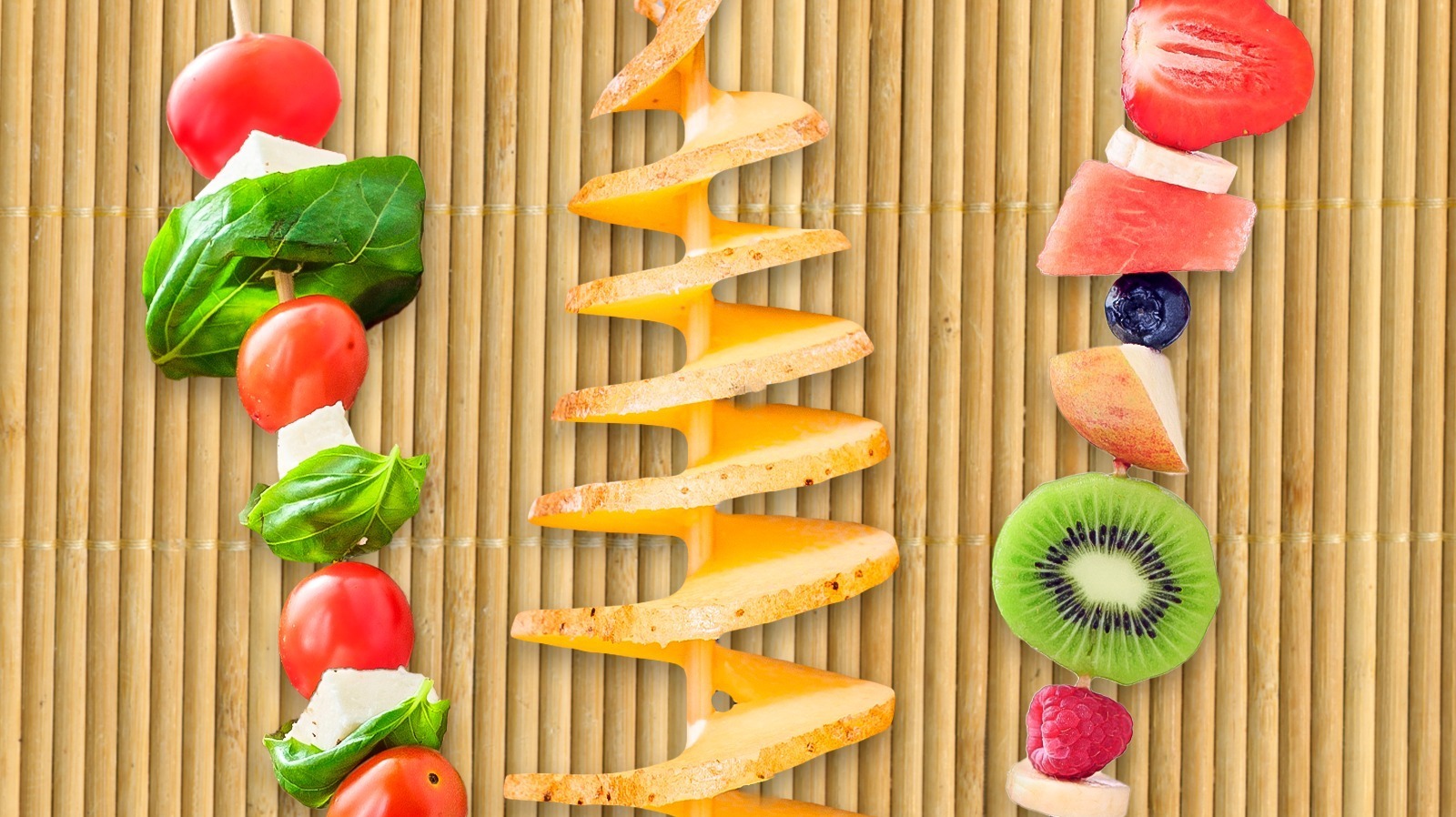Some of the best tools are multi-faceted and surprisingly handy when least expected. As to the best cooking tools, skewers should always be in your kitchen’s stock. They have a simple yet effective design that can elevate your cooking and party-hosting cool points. While the origins are unclear, we at least know that skewers have been around since Ancient Greece. Not only are they great for cooking, nothing beats eating food from a skewer. That probably explains why skewers are still popular to this day. Easy and useful — all you have to do is position the pointy side and insert it.
Kebabs are probably the first thing that comes to mind when you think of skewers, but these instruments of perfection can be used for so much more. From crispy spiral-cut hot dogs to toasted marshmallows; you can even take classic recipes off the plate and put them onto a skewer. Those are just a few of the fun and tasty ways to use them. Here is a list of more great, non-kebab, ways to use skewers.
Fruit and candy bouquets

fruitblossomsja/Instagram
While it’s hard to beat the sight of juicy kebabs, a refreshing array of fruit skewers can be equally eye-catching. One visually appealing way to spark a conversation at a party is with fruit or candy bouquets. A beautifully arranged assortment of skewered fruits will definitely put your summer barbecues a notch above the rest. The best part is that there are so many fruit-tastic combinations for you to experiment with. You can make one composed of different types of berries. A multi-colored pairing of strawberries, blackberries, blueberries, and raspberries offers a dynamic flavor and texture experience. Another fruit combo worth trying is apple, grape, and peach. If you really wanna impress, you can even create fruit and chocolate bouquets too.
Candy bouquets are similarly versatile. They are sugary floral arrangements perfect for gifting on special occasions like children’s birthdays, Mother’s Day, Valentine’s Day, and anniversaries. Small pieces of wrapped candy have a flower-like aesthetic and are best for large gatherings, whereas candy bouquets that incorporate popular brands like M&M’s and Skittles make better personal gifts.
Roasting marshmallows

Odds are you’ve roasted marshmallows at least once in your life. A family trip and summer camp classic, roasting marshmallows and making smores is a necessary childhood experience. That said, these chewy treats aren’t simply nostalgic, they are fun for all ages. There’s just something about the melty creamy consistency and sugary charred taste. In fact, roasting marshmallows has become so popular over the years that a National Day was created to celebrate it. Marshmallow lovers fill the sky with the smell of roasted sugariness each year on August 30th.
If, by chance, you missed out on campfire and smores, it’s never too late to try them. You don’t have to pack up the gear and rent a tent either, you can roast marshmallows at home over a gas stove or open-flame barbecue. Along with the traditional style, another tip for roasting marshmallows is to choose flavored ones. There’s salted caramel, cinnamon churro, Nutella, and more. And of course, you can always make smores too! Whichever you choose,
Grabbing and poking food
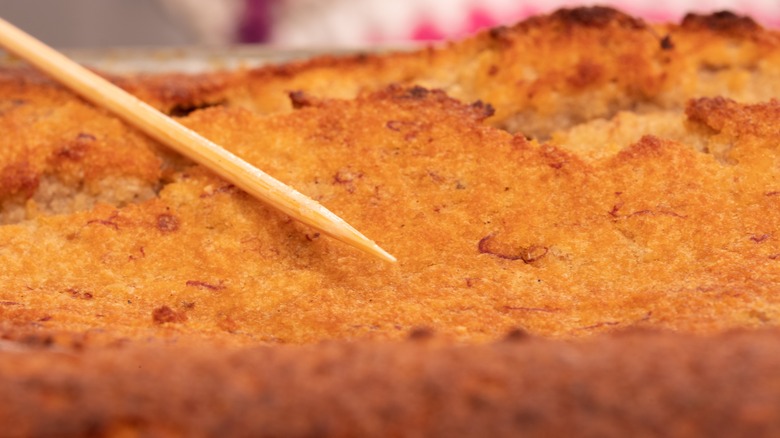
Skewers are surprisingly useful during the cooking process. You can use them to check if meats, casseroles, and baked goods are cooked on the inside, which is a common mistake even seasoned home chefs sometimes make. You simply poke them at the thickest part, let the skewer sit for a few seconds, and when you remove it, steam should be rising from the pointy tip. When testing cake doneness, the skewer should be clean and crumb-free when you pull it out. It’s called the “toothpick test,” which is funny because wooden skewers are essentially enlarged toothpicks. Besides ensuring that your food is cooked through, skewers can also be used to poke holes into thick cuts of meat or potatoes, which will help them cook more evenly.
Skewers are also excellent at grabbing small pieces of food. You can retrieve bits from crevices, inside of your oven or near a stovetop open flame, and of course, from atop mouthwatering platters. Those are just a few too — from removing fallen food particles in your toaster to stirring homemade beverages, the practical application is seemingly endless. You can finally get rid of that elusive bread crisp that’s stuck between your stove and counter.
Turning grilled hot dogs

Javier Crespo/Shutterstock
An American barbecue isn’t one without serving up some classic grilled hot dogs. They’re easy to prepare, quick to cook, and can feed lots of hungry guests. One downside to grilling hot dogs is their cylindrical shape — it makes them easily roll on grills, which can come in handy when you want to move them, but can be bothersome when you don’t. Using tongs, while efficient, is tedious and can be time-consuming if you’re grilling for a large group.
Use skewers to effortlessly turn hot dogs on the grill. Trust us, they make grilling hot dogs simple and hassle-free. Also, if you’re into the grill mark aesthetic, skewers are a great way to give hot dogs a lovely char. You can use wooden or bamboo skewers, just make sure to soak them so that they don’t burn — metal skewers work too. To put them to work, line your hot dogs up, then insert a skewer perpendicular through as many as you can. Use two skewers for either side of the hot dogs. To secure them, make sure that the pointy tip is clearly visible once inserted fully through. With your skewers in place, wave goodbye to rolling frankfurters.
Greek salad skewers
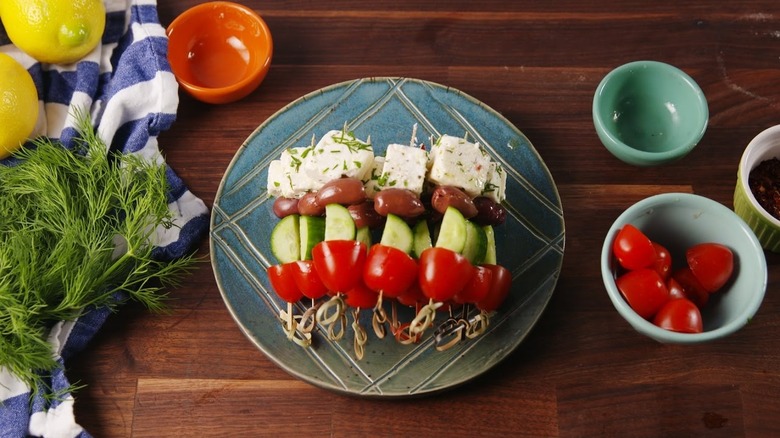
Delish/YouTube
Beyond juicy meats, chewy marshmallows, and vibrant bouquets, use skewers to put interesting spins on popular recipes. Ever thought about eating salad on a stick? Inject a dose of fun into your next Greek salad by swapping plates for pokes. The same way you arrange an assortment of meats on a wooden skewer, you can do with each ingredient to create Greek salad skewers. It uses the same traditional ingredients too. First, you have to cook garlic, fresh rosemary, dried oregano, and thyme in extra-virgin olive oil until fragrant and flavorful.
Next, add the marinade and feta to a bowl, along with additional olive oil, and let it sit for an hour or overnight for maximum herbaceous results. Once you finish marinating the feta, dip cherry tomatoes in the same blend. The final step is the easiest, simply thread one or two olives, a cherry tomato, a cube of feta, and vóila, fresh-tasting Greek salad skewers. They are the perfect little appetizer for get-togethers, or as quick and healthy bites to eat.
Sweet and savory Thanksgiving charcuterie
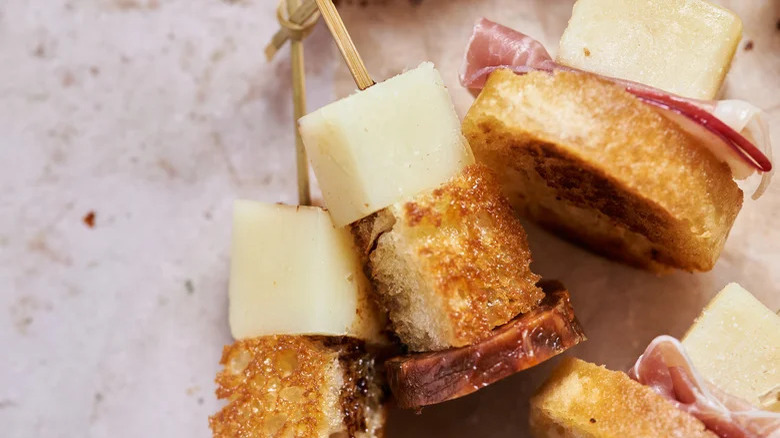
Michelle McGlinn/Look
As amazing as it can be to gather around the dinner table on Thanksgiving, eating the same foods each year can get pretty boring. It’s always good to leave space for some creativity and Thanksgiving is filled with classic dishes that are long overdue for a culinary make-over. One way to put a deliciously quaint spin on a traditional spread is with a sweet and savory Thanksgiving charcuterie skewer. This nifty twist is a great way to deliver the same classic flavors without the ensuing sleepiness.
The ingredients include olive oil, a small baguette, and loaf of sourdough, semi-hard cheeses like Manchego and Gruyère, cured chorizo and prosciutto, fig glaze, honey, and a sweet apple variety. One skewer can have toasted sourdough, a Manchego cube, and a slice of cured chorizo drizzled with fig glaze. Another can include a honey-topped crostini, Gruyère, a strip of prosciutto, and an apple slice. Feel free to pull out all the seasonal stops and experiment with a variety of delicious combinations.
Spiral-cut fries
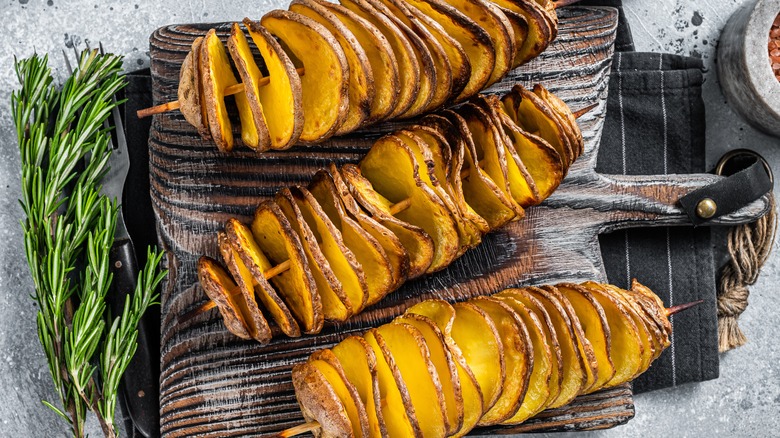
The debate over which fry style is the best is a contentious one. One unlikely contender is spiral-cut fries. The crispy curvature makes them not only tasty but perfect for grabbing and devouring. That said, without a spiralizer, homemade spiral-cut fries require a bit more preparation than most other varieties. Unlike a simple and straightforward julienne cut, you’ll need super skills to pull off a spiral cut using only a knife. Spiralizers can also cost a decent amount depending on what type you get. Thankfully, we’ve got the perfect hack to get spiral-cut fries.
For pure homemade starchy satisfaction, use a skewer. Start by inserting one into a peeled potato lengthwise. You then cut in a spiral motion, beginning at one side, and rotating the potato until the spiral reaches the opposite end. The goal is to keep the cuts as evenly spaced as possible — it’ll make the curly fries more restaurant-like. Once you’ve finished spiralizing them by hand, you can bake, fry, or air-fry them. Finish by adding salt or your favorite blend of seasonings, and take a spiral staircase to snack heaven.
Lemon juicing
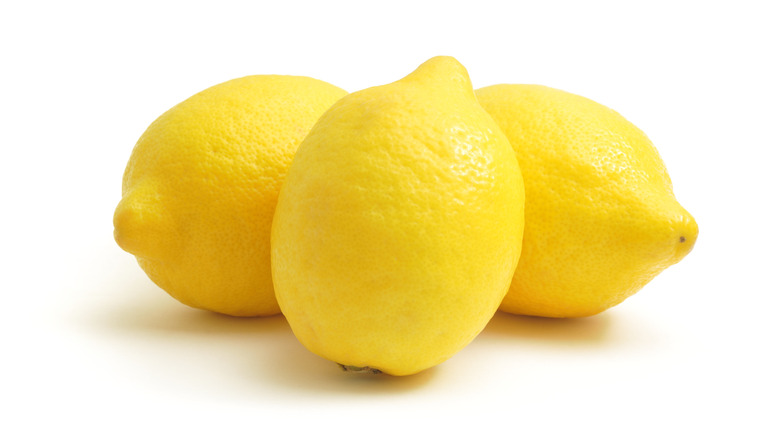
A spritz or squeeze of lemon juice can transform a plain dish into a flavorful feast. From savory steaks to summery beverages, lemon juice is one of the best ingredients around. It’s super healthy too, according to WebMD, a single lemon contains over half of your daily recommended Vitamin C intake. In other words, we all should be doing a lot more lemon juicing. One clever skewer hack for juicing lemons makes the process easy peasy.
Quick and mess-free, all you have to do is poke a skewer stem-side through the center of a lemon and squeeze it with your hand. Any style skewer can handle the job. To release the citrusy gold, 2 inches deep is sufficient. Remove the skewer next, and squeeze it like a stress ball until the very last drop. You’ll be surprised at how effortless and splatter-free skewers make lemon juicing. To extract even more juice, you can roll the lemon on a flat surface with your palm for 10 seconds before inserting the skewer.
Watermelon sticks
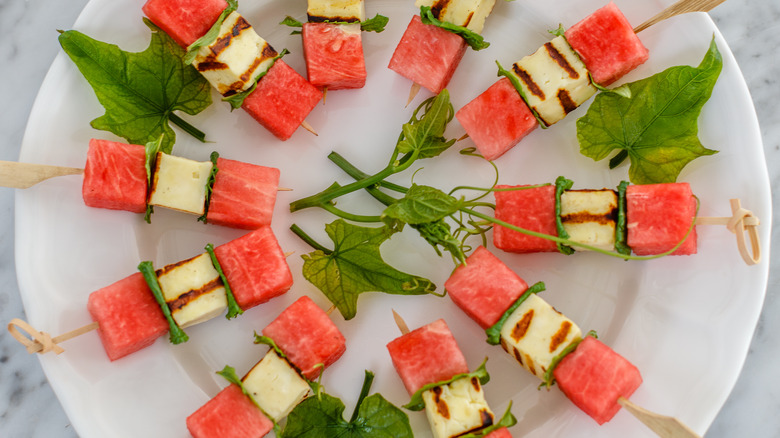
Refreshing and mouthwatering, watermelon is one of the world’s most popular fruits for a reason. Along with being remedies for sweltering summer days, they are loaded with flavor and nutrients. Watermelon is a versatile fruit that can be sliced, cubed, grilled, blended, and even served on a stick. That makes them perfect for any occasion. When it’s cold outside and you’re dreaming about sunny days, be sure to add watermelon sticks to the cookout menu. It’s a visually appealing alternative to your everyday fruit platter. You can cut them into even-sized cubes or into any shape you like. Watermelon sticks that alternate between cubes and triangles are always attention-grabbing.
Due to their large size, it’s always best to cut watermelon in half, then continually reposition it cut side down as you slice it. That’s how you get evenly-sized shapes, and also how you avoid injuring yourself. For a spicy kick, you can add some Mexican flare with Tajin seasoning. Or, mix things up with other fruit combinations.
Cinnamon brioche French toast

Elisa’s Eats Channel/YouTube
Make mornings a bit brighter with skewered cinnamon brioche French toast. Created by celebrity chef and television personality Richard Blais, it’s an inventive twist on a breakfast classic that might just become the new norm. Do away with the fork and knife and pull out the wooden skewers. Adult and kid-friendly, cinnamon toast on a stick is as easy to make as it is fun to eat. While Blais’ recipe mostly includes traditional ingredients, it also has a few interesting ones.
French toast can be made with many bread varieties, but this recipe specifically requires brioche bread. Although optional, another unique ingredient that’s listed is ras el hanout, which is a Moroccan spice blend. Blais’ recipe also includes floral elements like dried hibiscus flowers and lavender — the latter of which is also optional. Cinnamon brioche French toast on a stick takes a bit of prep, but only 10 minutes to cook 4 servings. If you want to take it to a whole other level, add strawberries, bananas, or blueberries to the skewer.
Salad skewers
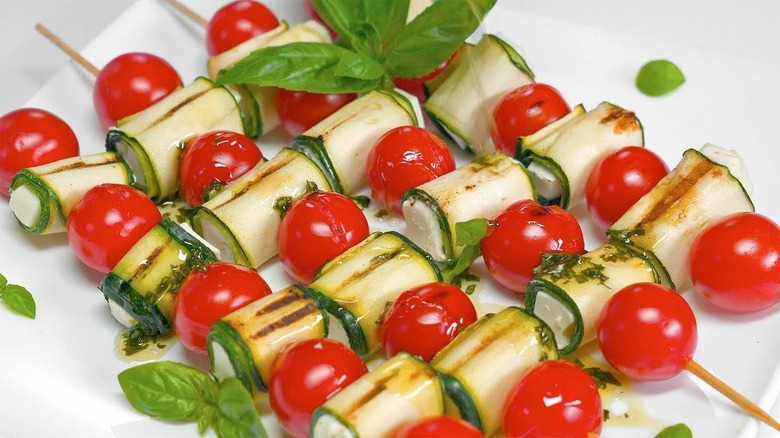
Always Yummy!/YouTube
Feta Greek salad is only one of many skewer-ready salad varieties. With a bit of culinary adventurousness, you can create all sorts of tasty salad skewers. Visually exciting and nutrient-rich, salad skewers are great for quick snacks, appetizers, sides, and healthy finger food at gatherings. You can revisit watermelon on a stick and include feta, basil leaves, and prosciutto for a Mediterranean-style experience. Another skewer-ready classic is Caesar salad. All you need is baby romaine lettuce, anchovies, a few slivers of shaved Parmesan, and homemade croutons. Rather than drizzling it with dressing, you can add it to a bowl for dipping.
While guests will surely be wowed by the presentation, there are some simple steps to keep in mind. When making salad skewers, it’s important that ingredients are cut into smaller bite-sized pieces. Dense additions like carrots must be sliced thinly so that the skewer can pierce through. With so many salad options, you’ll never run out of skewer recipes to try.
Easy pasta skewers
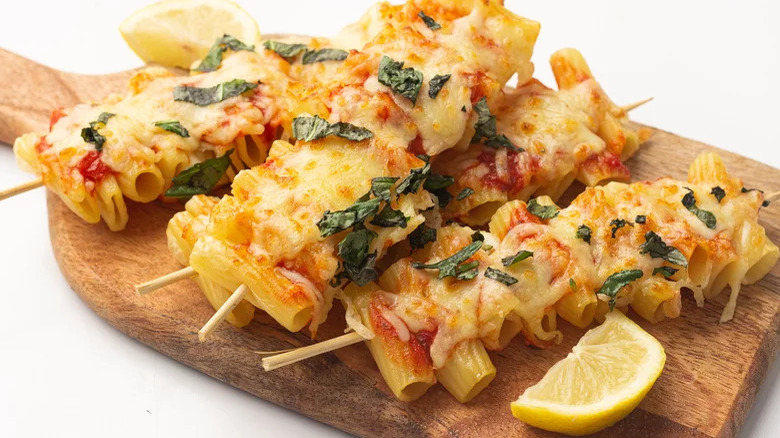
Susan Olayinka/Mashed
While meats, veggies, and fruits are easy go-tos, you should seriously consider making pasta skewers. It’s a clever way to transform pasta into scrumptious food on a stick. Leave it to TikTok, a hub for all sorts of recipe hacks, to share this fun take on pasta. Developed by Susan Olayinka, founder of The Flexible Fridge, these skewers are made with simple ingredients like rigatoni (or similar styles), salt, fresh basil, marinara sauce, and mozzarella. You can also spruce it up further with veggies or cubed meats.
Pasta skewers are perfect appetizers for the whole family and can be cooked in just 30 minutes. The recipe is mostly traditional; boil the pasta and prepare the ingredients. Then comes the fun part; thread the finished noodles with a skewer, place them atop a baking pan, apply the marinara and additional ingredients, then toss it in the oven at 400 F for 5 minutes. When the ding goes off, open the stove and feast your eyes on your new skewer go-to.
Caprese skewers with pesto
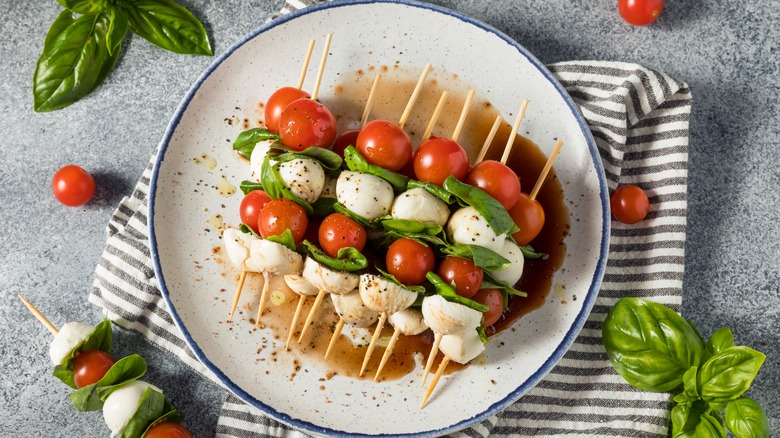
Another classic salad we recommend “skewer-fying” is Caprese. Herbaceous and refreshing, a platter of this party-pleaser will disappear before you know it. Caprese skewers with pesto are awesome starters for Italian meals or as solo snacks. We definitely recommend making some for your next get-together. The ingredients are simple and healthy, which makes it easy to serve to large groups. The combination of grassy basil leaves, garlic, toasty pine nuts, cherry tomatoes, savory mozzarella, and extra-virgin olive oil is just enough to satiate the appetite while you wait for the main course.
Whether a favorite go-to or a first-time taste, Caprese salad with pesto is a flavor everyone can enjoy. The best part is there is no cooking required, all you have to do is prep a handful of ingredients, thread a skewer through, and let the good times roll. We’ve no doubt that you’ll be adding this to your list of recipes to try.
Grilled tsukune
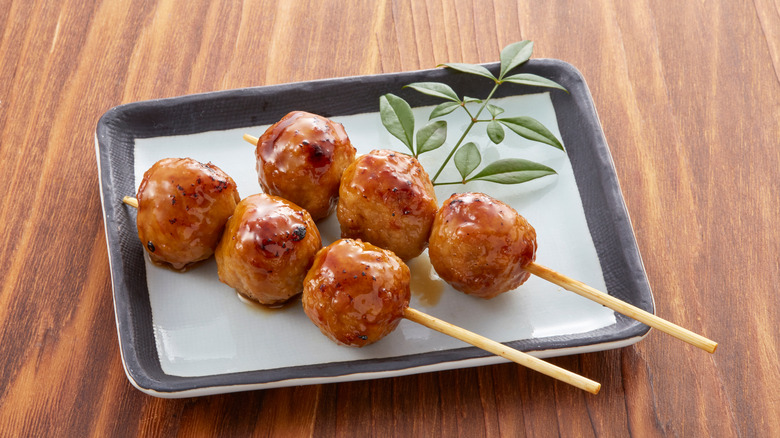
Skewer recipes are popular around the world for a good reason. They are fun, easy, and versatile. In Japan, yakitori is a popular skewer and chicken is the primary protein. There, you can enjoy many types of yakitori that incorporate various parts of a chicken. One type of yakitori we highly recommend trying is called tsukune, or grilled chicken meatballs. Equally mouthwatering, tsukune is made using ground chicken, eggs, spices, and various vegetables. If you imagine the perfect meatball, you’re probably thinking about tsukune. With a crispy exterior and juicy inside, these tiny succulent bites are craveably delicious.
Tsukune skewers are cooked over a charcoal grill, giving them a lovely smokey taste. It’s a versatile snack that can be customized with different ingredients. In fact, in different Japanese regions, you’ll find distinct varieties of tsukune. Popular ingredients include onions, garlic, and ginger, while yuzu zest, mirin, shiso leaves, eggs, and panko breadcrumbs are sometimes used too. It’s typically served with tare, a sweet soy-sauce-based sauce that is also sometimes used as a baste when cooking. Once you try tsukune skewers, there’s a good chance that you’ll be inspired to add it to pasta, or into a sandwich.
Potluck potato salad
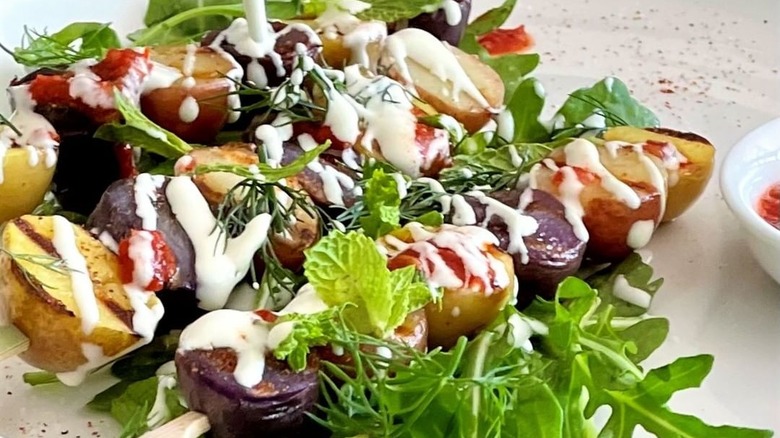
latourangelle/Instagram
When you’re on a food budget, but still like to be social, nothing beats a potluck. A spread of random dishes that somehow meld perfectly. Maybe it’s the friendship in the air? When it comes to potlucks, or gatherings in general, potato salad is definitely a popular dish. Filling, fresh-tasting, and flavorful, it’s a classic that’s just waiting to be skewered. Potato salad skewers are basically deconstructed potato salads, and what’s great about these tuberous skewers is that you can make them using any style of potato salad.
From Mediterranean-style with kalamata olives, red onions, and lemony vinaigrette, to grilled mayo-free potato salad with fresh herbs and peppers, you’ll never run out of skewer recipes. Potato salad skewers are delicious appetizers or served alongside grilled chicken. Whichever you choose to try, prepare to be impressed, or better yet, prepare to impress your friends at the next potluck.



